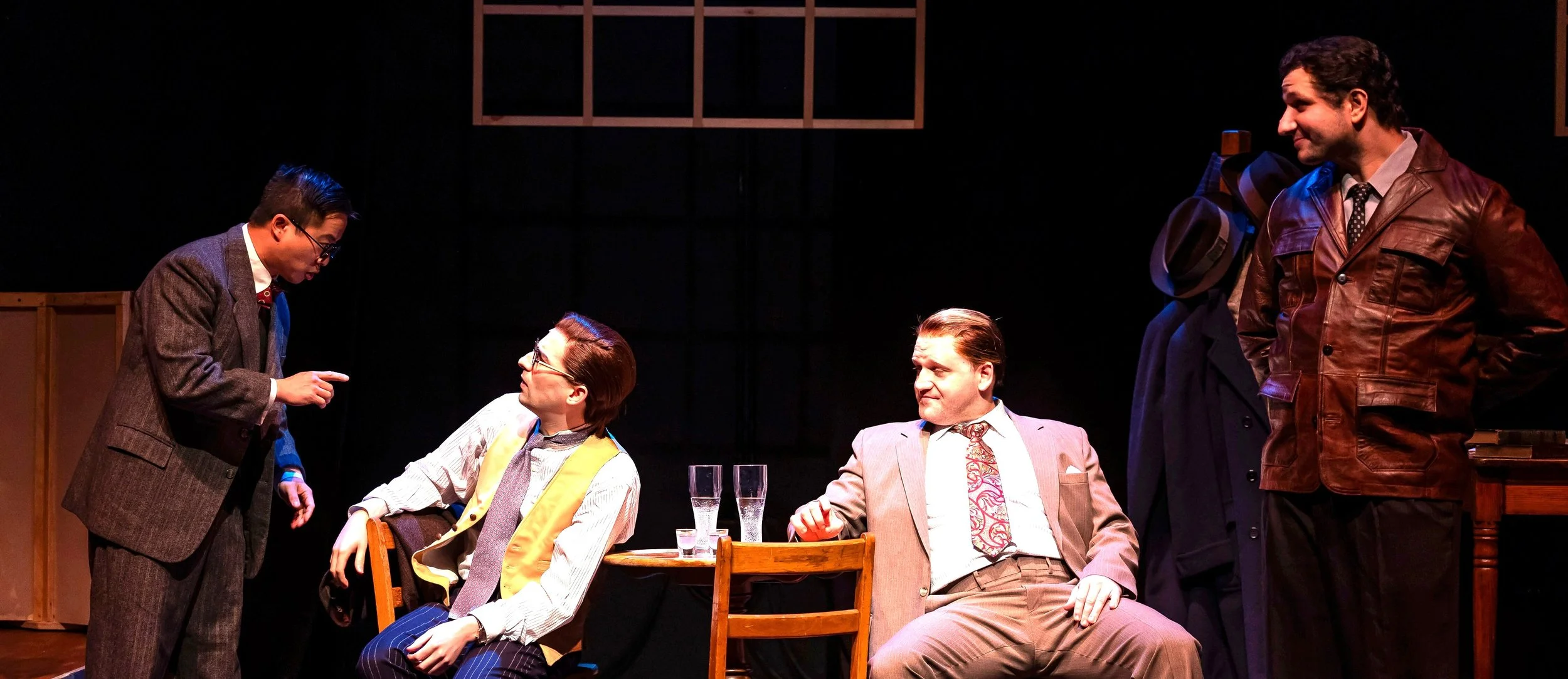Potomac Theatre Project’s Sex, Grift and Death, an evening of one-acts by British playwrights Steven Berkoff and Caryl Churchill, captures the brutal nature of sex, financial survival, death, and illness. The lively cast uses a mixture of British and American accents that work for the sensibility of each piece.
Havel: The Passion of Thought
Potomac Theater Project (PTP) has assembled an evening of political theater, presenting three short plays by the Czech playwright and dissident Vaclav Havel, who went on to become the country’s president, and bookending them with shorts by Harold Pinter and Samuel Beckett. The five plays together are given the title Havel: The Passion of Thought, and are all directed by PTP founder and coartistic director Richard Romagnoli.
Pity in History
Howard Barker’s Pity in History is a deeply thought-provoking play, which uses the events of the 17th-century English Civil War (a fight to overthrow the monarchy and replace it with a parliamentary government) but is set in contemporary times, to explore the meaning of life, death and relationships. Barker wrote the play in 1984 for BBC television, and its antiwar attitude is clear. It opens on a British platoon that comes to represent any thuggish mass that makes up a military unit. It’s easy to imagine this very same platoon in the Falklands, Afghanistan, or Iraq. After all, war is war, and all war is hell.
Arcadia
Tom Stoppard’s Arcadia exemplifies the British playwright’s gift for combining intellectual inspection of the corners of science, philosophy and history with high comedy. The wit is dry, but the plays are juicy, and Arcadia, along with Travesties and The Invention of Love, is one of his best.
Sliding into Darkness
The play has been lauded as one of the best English-language examples of the German experience during the Nazi regime. It follows the life of John Halder (Michael Kaye), a professor devoted to his wife (Valerie Leonard) and children who falls in love with a student (Caitlin Rose Duffy). His elderly mother (Judith Chaffee), who can no longer see and suffers from neurotic breakdowns, is institutionalized in a health care facility. She laments often, “What have I got to live for?” Halder has been so moved by her experience that he has written a book on compassionate euthanasia that has caught the attention of the Nazis.
Halder succumbs to the praise the Nazis have foisted on him. Though one of Halder’s best friends is Maurice (Tim Spears,) a Jewish analyst who is well aware of the coming dangers and hopes to get his family to Switzerland, Halder continually tries to reassure him, stating, “...all that anti-Jewish rubbish. Just balloons they throw up in the air to distract the masses.” They use his writings and his work at the university to pressure him to lead a book burning, which he does, asking if he can keep his books.
An underlying popular musical theme provides Halder an Everyman appeal as he shrugs off the propaganda as a passing fad. A longing to belong and the middle-aged man’s desire to avoid his family obligations round out the character. Whatever core beliefs Halder has held are overshadowed by the sheer power of the Nazi machine and the propaganda— “Deutschland Über Alles.”
The overall set design is inventive yet simple—wooden boxes of different sizes that are thrust together or pulled apart to create seating, along with an upright piano that is used to house props. Both are employed by Petosa to create the height, movement, and tension appropriate to the play. The palette for the costumes by Jessica Vankempen seems appropriate for late-1930s Germany. Only the lighting by Hallie Zieselman is problematic. It could be that she is at odds with the house trading off curtain times with the PTP/NYC production of Howard Barker's No End of Blame, but the lighting is sketchy, too often leaves the actors in the dark, and feels like an afterthought.
Frankly, the great challenge for director Jim Petosa’s heart-wrenching revival is the backdrop of politics 2016. The vitriol used to deliver misogyny, xenophobia, and homophobia among so many other divisive tactics being employed by politicians and pundits today makes this play almost pale by comparison. In Good, the horrors of Nazi Germany can be felt in Petosa’s direction of Kristallnacht, with so many good people standing aside. The question is, Can mankind learn?
C. P. Taylor’s Good runs through Aug. 6 at The Atlantic Stage 2, on 16th Street between Eighth and Ninth Avenues. Evening performances are 7 p.m. Tuesdays through Sundays; matinees are at 2 p.m. Wednesdays, Saturdays and Sundays. Good runs in repertory with No End of Blame by Howard Barker; for exact days and times, visit PTPNYC.org. Tickets are $35, $20 for students and seniors and may be purchased by calling 1-866-811-4111 or online at PTPNYC.org.












